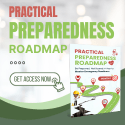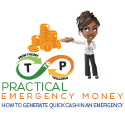We may always hear or read, when it comes to an emergency, we must plan ahead.
But do we even think of planning for it?
No matter where we are, no matter what we’re doing, everybody is subject to disasters.
No one is exempted.
When it comes to disasters, not only the natural ones that can cause severe damage and endanger lives, man-made disasters too! Both are terrifying and can be deadly to people and properties.
That is why preparation is essential for the safety of you and your family.
Although government agencies have excellent information to get everyone started, it is still our sole responsibility to make a plan FOR ONCE the inevitable happens.
We are so comfortable with our everyday lives that we tend to forget these things that may occur in our lifetime.
What if when disaster strikes, you and your family may not be together?
Are you still gonna be relaxed and can think straight of what to do?
Keep in mind, that if people are unprepared, the risk of mass panic can often cause more casualties than the disaster itself. When people think they are in danger, the first reaction can always lead to a more dangerous situation, especially if they are part of a large group of people trying to do the same thing.
But if you have considered making plans, once it happened, you can easily just follow that without you thinking much.
So how are you going to prepare for such situations?
First, it’s important to know what type of disasters could affect your area. Is your place prone to earthquakes, hurricanes, or wildfires? Or does your country has terrorism or impending war threat?
After identifying what threat you could be facing, start your emergency plan by putting together a plan and discussing this with your family.
Here are some questions you can use to start with.
-
What is my family’s communication plan?
Surely, we have to consider that there could be power outages during and after a disaster takes place. Yeah, each one in the family might have their own cellphones, but what if there will be no cellular signal? Or power outages might take several days, there’s no way we could charge our phone?
Here’s where radio communication can come in handy. Amateur radio communication is often used in times of crisis. You can try to check this Arcshell Rechargeable Long Range Two-Way Radios. They’re small and convenient in size; they will easily fit in your hand; are solidly built; it is water-resistant and the best part, it’s easy to operate for all ages!
-
What is my shelter plan?
When disaster strikes, sheltering is a necessary action to seek protection. It can be in your house, where you work, at friends or relatives’ house, or other locations.
To effectively plan this, you have to consider first the nature of the disaster that can happen in your area then choose a place in your house or other building that is safe for that hazard. There may be situations like for example a tornado, it’s simply best to find a room that is in a basement in your house or nearby building.
And during the sheltering, you need to ensure that you have food and water supplies for you and your family.
-
What is my evacuation route?
There may be times that a disaster may cause an evacuation. In some situations, you may have a few days to prepare, while in other instances, it might be an immediate evacuation.
This is why planning ahead is vital for anybody to evacuate quickly and safely no matter the circumstances.
Identify several places you could go in an emergency like a friend’s or relative’s house in another town. Choose destinations in different directions so that you have options during an emergency.
You also need to assemble supplies that you can grab right away in times of emergency.
You can check this Family Emergency Survival Bag/Kit that is equipped with 72 Hours of Disaster Preparedness Supplies for 4 People.
Preparing for a disaster might seem like an impossible task but remember, disasters don’t plan ahead, BUT YOU CAN.










